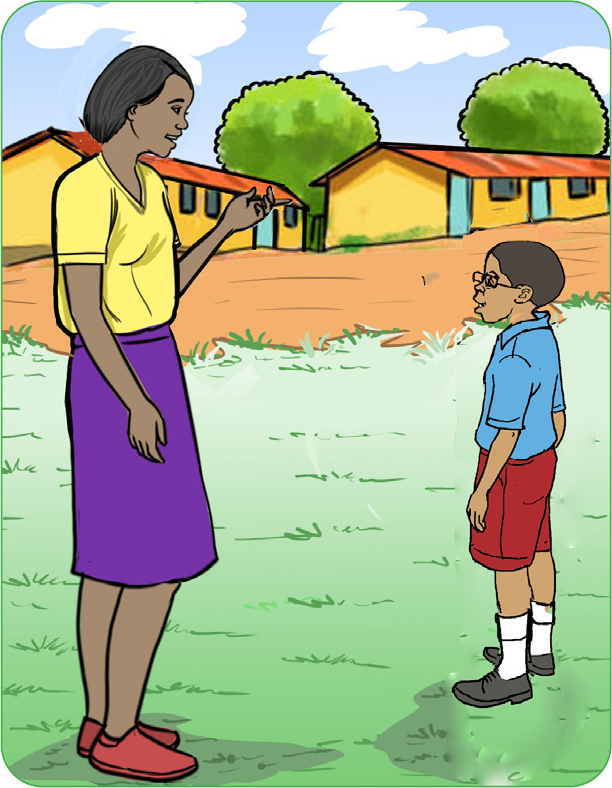Get Set
In groups, talk about what you understand by personal responsibility.
In groups, talk about what you understand by personal responsibility.
Act out the following dialogue in pairs.
Teacher: | Good morning. I do not think we have met. |
Student: | Good morning, Madam. No, we have not met. This is my first day in this school. |
Teacher: | What is your name? I am Teacher Moraa. |
Student: | My name is Chege Cherere, Madam. |
Teacher: | I am delighted to meet you, Chege. Welcome to Joyspring School. I am sure you will be very happy here. |
Student: | Thank you,Teacher Moraa. I know many of your former students and they all say very nice things about the school. |
Teacher: | Oh! Do they? Thanks. I am glad to hear this. |
Student: | I look forward to learning many things in this school. |
Teacher: | Yes you will, Chege. I need to meet someone in the office. Please, excuse me. I hope you settle down quickly. Good day. |
Student: | Thank you very much. Good day, Teacher Moraa. |

A | B |
|
|
(A boy and a girl meet during a club meeting)
Mwari: | Good morning. (Looking at the boy and greeting him) My name is Mwari. What is your name? |
Mpaayei: | Good morning, Mwari. My name is Chuck Mpaayei. (Smiles) I am pleased to meet you. |
Mwari: | (Sounding curious) Are you new here? I don’t think we have met. |
Mpaayei: | (Shaking his head) No, I am not new. However, I am in a different stream. Perhaps that is why we have not met. |
Mwari: | This is the first time I am attending this club meeting. I want to be a member. |
Mpaayei: | Welcome. I have been a member for some time. In fact, I am the secretary. |
Mwari: | (Looking happy) Oh! Congratulations. |
Mpaayei: | (Bowing slightly) Thank you, Mwari. |
Work in groups of three and do the following.
Mary: | Hello. My name is Mary Akina. |
Kolosho: | Hello, Mary. My name is Kolosho Temo. It is my pleasure to meet you. |
Mary: | Thank you. It is a pleasure to meet you too. |
Use books or the Internet to search for information on the different types of introductions and share it with your classmates or someone at home.

What would you like to do with the text? The text is processed by artificial intelligence, it is not checked or edited! The text may contain errors. Check the accuracy of the text against the original text in the textbook.
Choose the files you want to add. Supported formats are txt, html, htm, pdf, odt, odp, ods, xls, xlsx, ppt, pptx, pps, doc, docx, rtf, png, jpg, jpeg and gif.
| Name | |
|---|---|
| remove |
NB! Links must begin with: “http://”!
Opiq uses essential cookies to make our website work, to help keep you safe, to analyse user interaction and to improve user experience.
Cookie is a small file which is sent from users computer to the website server. It includes necessary information for the website to operate and includes information about the user and their preferences.
Most of the cookies are necessary for the operation of Opiq. It is possible to deny analytical cookies and in that case your usage data is not used to develop and improve Opiq services. Read more